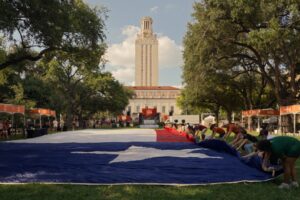AUSTIN, Texas—A conference honoring Charles Hartshorne, Ashbel Smith Professor Emeritus of Philosophy at UT Austin, will be held on campus Oct. 10-11 on the occasion of his 100th birthday.
The event is co-sponsored by the department of philosophy, the College of Liberal Arts, Religious Studies Program, and the Office of Vice President and Dean of Graduate Studies.
Encyclopedia Britannica 3 refers to Hartshorne, a renowned philosopher of religion, as “the world’s greatest living metaphysician.” The recent publication of a volume in his honor in the Library of Living Philosophers series confirms this position. The first volume in the series was dedicated to John Dewey. Subsequent volumes have been dedicated to Bertrand Russell, G.E. Moore, Alfred North Whitehead, Albert Einstein, John-Paul Sartre, Karl Jaspers, Gabriel Marcel, Karl Popper and others. The Hartshorne volume is the 21st in the series.
The conference, which is expected to attract visiting scholars from throughout the nation, is scheduled to open at 3 p.m. in the Lila B. Etter Alumni Center with a lecture for a general audience by George R. Lucas Jr. titled, “Hartshorne: The Last or the First?” A public reception in honor of Hartshorne will follow the lecture.
On Oct. 11 in UTC 3.110, four principal speakers will present the following symposia: “Why 100 Years Is Forever: Hartshorne’s Account of Immortality” with Randall E. Auxier from 9 to 10 a.m.; “The Onto-Epistemic Primacy of Experience,” with Jorge L. Nobo at 10:30-11:30 a.m.; “Hartshorne, Whitehead and the Religious Availability of God” with William T. Myers at 1:30-2:30 p.m.; and “Charles Hartshorne and the Openness of God” with Donald W. Viney from 3 to 4 p.m.
Hartshorne taught at Harvard University, The University of Chicago and Emory University before coming to UT Austin, where he taught for 15 years before retiring in the 1970s. Since that time, he has traveled throughout the world to speak at conferences held in his honor (e.g. in Leuven, Belgium, Kyoto, Japan, Benares, India and the University of Chicago).
As a student at Harvard in the 1920s, he was an assistant of Alfred North Whitehead, whose work he has further developed into what has become known as “process philosophy and process theology.” He also was senior editor of the papers of Charles S. Peirce, the logician and founder of American pragmatism. One of Hartshorne’s main interests has been the application of process philosophy to religious issues, where his reconstructions of traditional ideas about God are generally regarded as among the most innovative and influential contributions to philosophy of religion in the 20th century. He has been president of five learned societies and also is an elected member of the American Ornithological Union because of his internationally known writings in ornithology.
He has written more than 20 books and more than 100 articles on numerous aspects of philosophy, including The Divine Relativity, The Logic of Perfection, Creative Synthesis and Philosophic Method, Insights and Oversights of the Great Philosophers, and in recent years, Omnipotence and other Theological Mistakes, and Wisdom as Moderation.
Hundreds of Ph. D. dissertations and books have been written about his philosophical and theological ideas in many different languages. A philosophical journal, Process Studies, and a Center of Process Studies (at Claremont, California) are devoted to the work of Whitehead and Hartshorne, and the movements they have inspired.



